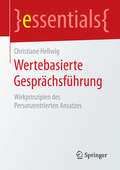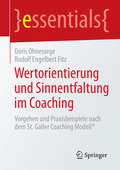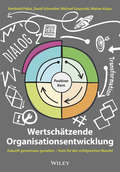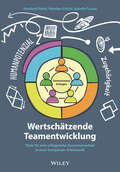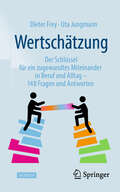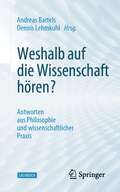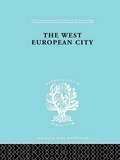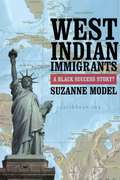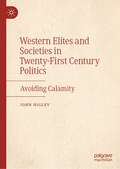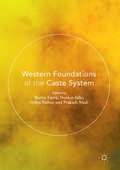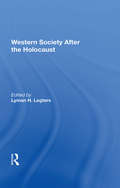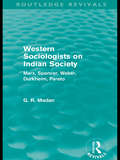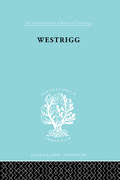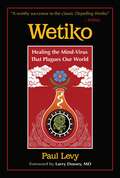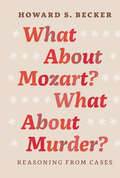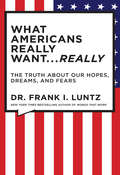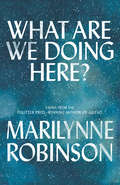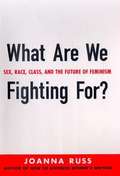- Table View
- List View
Wertebasierte Gesprächsführung: Wirkprinzipien des Personzentrierten Ansatzes (essentials)
by Christiane HellwigPraxisnah erläutert die Autorin die grundlegenden Begriffe des Personzentrierten Ansatzes und seine Bedeutung für eine wertebasierte Gesprächsführung. Mit der damit verbundenen Haltung werden Menschen darin unterstützt, ihrer Motivation auf die Spur zu kommen und im wörtlichen Sinn selbst-bewusst zu handeln. Die nach dem Personzentrierten Ansatz von Carl Rogers beschriebenen Wirkprinzipien tragen maßgeblich dazu bei und werden hier mit Beispielen aus dem Coaching und dem Führungsalltag eingängig dargestellt. Sie sind Erfolgsfaktoren und das Fundament wertschätzender Kommunikation. Und sie wirken kontextübergreifend: Sie sind Grundlage für Gespräche in psychosozialen genauso wie in wirtschaftlichen Arbeitsfeldern.
Wertorientierung und Sinnentfaltung im Coaching: Vorgehen und Praxisbeispiele nach dem St. Galler Coaching Modell® (essentials)
by Doris Ohnesorge Rudolf Engelbert FitzDoris Ohnesorge und Rudolf E. Fitz positionieren zunächst die These, dass Menschen sich Ziele nicht der Ziele wegen setzen, sondern weil sie Werte vermehren oder Wertverletzungen vermeiden wollen. Aufbauend darauf beschreiben die Autoren, warum und wie Werte im Zusammenhang mit Entwicklungsvorgängen der wesentliche Antrieb für Menschen sind. Diese Wirkung zeigt sich besonders im Kontext Führung, Beratung und Coaching. Werte beinhalten nämlich eine zentrale und starke Dynamik, den Sinn. Erst eine Sinnentfaltung lässt Menschen nicht nur zufrieden, sondern sinnerfüllt leben und arbeiten. Aus dieser Grundüberlegung heraus entstand das St. Galler Coaching Modell®, das auf Werteentwicklung ausgerichtet ist. Ziel der jahrelangen Evaluierung dieses Modells war es, alle entwicklungsrelevanten Elemente in Veränderungsvorgängen zu identifizieren und in ein systemisches und systematisches Modell zu übertragen.
Wertorientierungen und Wahlverhalten: Effekte gesellschaftlicher Wertorientierungen bei den Bundestagswahlen 2009 - 2017 (Wahlen und politische Einstellungen)
by L. Constantin WurthmannIn diesem Open-Access-Buch untersucht L. Constantin Wurthmann die sehr enge Beziehung zwischen Wertorientierungen und Wahlverhalten. Obwohl Wertorientierungen und gesellschaftliche Wertorientierungen im Speziellen zu den zentralsten Konzepten empirischer Sozialforschung gehören, wurde ihre Wirkungsweise im Wahlverhalten bisweilen stiefmütterlich behandelt. Die vorliegende Studie entwickelt einen Vorschlag zur konzeptionellen Erfassung gesellschaftlicher Wertorientierungen und deren Einfluss auf das Wahlverhalten der bundesdeutschen Bevölkerung, welcher anschließend mit Daten der German Longitudinal Election Study (GLES) für die Bundestagswahlen 2009, 2013 und 2017 überprüft wird. Dabei lassen sich strukturelle Veränderungen gesellschaftlicher Wertorientierungen in den Wählerschaften deutscher Parteien nachweisen.
Wertorientierungen und organisationale Werte in Laufbahnen: Eine rekonstruktive Studie in einem Finanzdienstleistungsunternehmen
by Katharina AgostiniKatharina Agostini untersucht in dieser qualitativ-rekonstruktiven Studie die Bedeutsamkeit von Wertorientierungen und organisationalen Werten für das Alltagshandeln von Akteuren und Akteurinnen eines öffentlich-rechtlichen Finanzdienstleistungsunternehmens. Die Autorin setzt verschiedene theoretische Sichtweisen in Bezug zueinander und eröffnet Perspektiven auf handlungspraktische, organisationale sowie geschlechts-, hierarchie- und laufbahnbezogene Aspekte. Die Ergebnisse aus qualitativen Interviews mit Mitarbeitenden und Führungskräften liefern einen wichtigen Beitrag für den Diskurs um die Bedeutung individueller Wertorientierungen sowie organisationaler Werte im Kontext beruflichen Handelns und Erlebens.
Wertschätzende Organisationsentwicklung: Zukunft gemeinsam gestalten - Tools für den erfolgreichen Wandel
by David Schneider Reinhold Pabst Michael Soszynski Marian KujauIn ihrem Buch beschreiben die Autoren die Grundlagen von Organisationsentwicklungsprozessen und Gestaltungsmöglichkeiten. Methodisch basiert das Buch auf dem "Appreciative Inquiry" Ansatz für wertschätzende Organisationsentwicklung. Die angebotenen Werkzeuge zielen auf Lösungsfokussierung und Ressourcenaktivierung bei gleichzeitiger Wertschätzung dessen, was gut funktioniert. Im Buch beschreiben die Autoren zunächst die Grundlagen der Organisationsentwicklung, indem sie wichtige Begriffe kurz erläutern und visualisieren. Außerdem finden sich einige Storytelling-Elemente zur Vermittlung der Inhalte und einen ausgeprägten Serviceteil mit Stimmen aus der Praxis. Weitergehend bringen die vier Autoren, ihre eigene angewandte Erfahrung aus verschiedenen Organisationsentwicklungsprojekten mit ein. Die Organisationsentwicklungsmethode "Appreciative Inquiry (AI)" bzw. Wertschätzende Erkundung ist ein positiver Ansatz für Transformationsprozesse. Er verändert die Blickweise von der Herausforderung oder Problemsituation auf die Lösungsfokussierung und Ressourcenaktivierung. Der 5D-Zyklus von "Appreciative Inquiry" (Define, Discover, Dream, Design, Deliver) gibt die Struktur für die Werkzeuge, die in diesem Buch vorgestellt werden, vor. Für jede der fünf Prozessphasen stellen die vier Autoren ihre erprobten Lieblingstools vor. Sie bieten dem Anwender einen schnellen und unmittelbaren Einstieg in die praktische Umsetzung. Im abschließenden Kapitel bieten die Autoren die Herangehensweisen und Lösungsansätze für verschiedene Anlässe von Organisationsentwicklungsprojekten.
Wertschätzende Teamentwicklung: Tools für eine erfolgreiche Zusammenarbeit in einer komplexen Arbeitswelt
by Reinhold Pabst Mareike Schutt Isabelle TyrasaIn "Wertschätzende Teamentwicklung" beschreiben die Autoren die Grundlagen von Teamentwicklungsprozessen. Die Betonung liegt auf Humanpotenzialen: Das sind Werte, die ein Zusammengehörigkeitsgefühl fördern. Diese sollten vorgelebt und gefördert werden. Weiterhin gilt es, die Interaktion in der Zusammenarbeit zu fördern, den Beziehungsaufbau aktiv zu gestalten und Anreize für eine selbst- und fremdmotivierte Beteiligung zu schaffen. "Wertschätzende Teamentwicklung" stärkt den Zusammenhalt im Team, das Wissensmanagement sowie die Lernkultur. Konzepte und Tools für die Anwendung werden mit inspirierenden Stimmen aus der Praxis ergänzt, um ein möglichst ganzheitliches und praxisnahes Bild auf die Thematik zu werfen. Methodisch werden Anreize gesetzt, lineare Denkpfade zu verlassen und eigene Routinen zu reflektieren. Ziel ist die Gestaltung einer wünschenswerten Zukunft! Dazu müssen relevante Probleme adressiert und selbst eine Haltung entwickelt werden, die die Sinnhaftigkeit von Lösungen hinterfragt. Das Buch basiert auf dem "Appreciative Inquiry"-Ansatz für wertschätzende Organisationsentwicklung sowie auf der konstruktivistischen Annahme, dass jedes menschliche Handeln von Wirklichkeitskonstruktionen gesteuert sei. Das heißt, die Perspektiven bzw. die Blickwinkel, die ein Mensch einnimmt, bestimmen, was er wahrnimmt. Durch die Änderung der Perspektive kann gleichzeitig auch die Problemsituation verändert werden. Die im Buch angebotenen Werkzeuge zielen auf eine Lösungsfokussierung und Ressourcenaktivierung bei gleichzeitiger Wertschätzung von dem, was bereits gut funktioniert.
Wertschätzung: Der Schlüssel für ein zugewandtes Miteinander in Beruf und Alltag – 148 Fragen und Antworten
by Dieter Frey Uta JungmannMit Wertschätzung handeln und behandelt werden – das wollen viele. Doch wie kann uns das in Zeiten von Krisen und Konflikten gelingen? Dieter Frey, anerkannter Sozial- und Organisationspsychologe, gibt darauf im Gespräch mit der Journalistin Uta Jungmann zahlreiche Antworten und macht deutlich: Gerade, wenn es schwierig wird, zeigt sich, wie wirkungsvoll Wertschätzung ist – als Kitt, der das Team im Unternehmen zusammenhält und stärkt. Als Bindeglied zwischen Menschen im Alltag, an der Universität, in der Schule oder der Familie. Für ein zugewandtes Miteinander am Arbeitsplatz und in einer von Spaltung bedrohten Gesellschaft. Anhand vieler Beispiele schildert der Psychologe, anschaulich und auf anregende Weise, wie sich mit Wertschätzung ganz konkret Brücken zu anderen Menschen bauen lassen, und mit ihr jeder einen Schlüssel für schwierige Situationen in der Hand hält. – Ein Buch für alle, die sich angesichts zunehmender Polarisierung tiefer mit Wertschätzung befassen möchten und überlegen, wie sie im Beruf gefördert werden kann – damit das Leben und Arbeiten in einer Welt des Umbruchs für alle entspannter wird.
Wertschöpfung hybrid gestalten: Geschäftsmodellentwicklung und Arbeitsgestaltung in der Digitalisierung (ifaa-Edition)
by ifaa – Institut für angewandte Arbeitswissenschaft e. V.In diesem Open-Access-Buch ist die Digitalisierung von Geschäftsmodellen anhand von Praxisbeispielen beschrieben. Dies umfasst einerseits die Entwicklung digitaler bzw. hybrider Geschäftsmodelle und andererseits die Gestaltung des Umsetzungsprozesses im Unternehmen. Dazu zählen Veränderungen an Strukturen der Aufbau- und Ablauforganisation ebenso wie an Zusammenarbeit, Führung und Kompetenzbedarf. Alle Vorgehensweisen und Lösungen sind anschaulich dargestellt. Damit verbundene Potenziale werden ebenso aufgezeigt wie kritische Erfolgsfaktoren.
Weshalb auf die Wissenschaft hören?: Antworten aus Philosophie und wissenschaftlicher Praxis
by Dennis Lehmkuhl Andreas BartelsPandemie und Klimakrise rufen die herausragende Rolle der Wissenschaft und des wissenschaftlichen Wissens für Informierung und Orientierung der Gesellschaft sowie für die Beratung der Politik bei der Ausrichtung praktischer Maßnahmen ins Bewusstsein. In diesem Zusammenhang wird die Frage virulent, weshalb der Wissenschaft diese herausgehobene Rolle zukommt. Dass diese Frage trotz der vielbeschworenen Autorität der Wissenschaft alles andere als trivial ist, zeigt sich daran, dass Wissenschaftsskepsis und Relativierung wissenschaftlicher Resultate bis hin zur Wissenschaftsleugnung Einfluss gewinnen, sobald es um konkrete Fragen der Ausrichtung gesellschaftlichen Handelns an der Wissenschaft geht. Wodurch ist also Vertrauen in die durch die Wissenschaft ermittelten Fakten, die in ihren Modellen entworfenen Szenarien und ihre Ratschläge an Gesellschaft und Politik gerechtfertigt? Weshalb soll man der Wissenschaft in besonderem Maße vertrauen und auf ihren Ratschlag hören?Insgesamt sollen die Beiträge des Buches Aufschluss darüber geben, wodurch die Vertrauenswürdigkeit der Wissenschaft in ihrer modernen Form gerechtfertigt ist und an welche Bedingungen ihre besondere Rolle in der Gesellschaft geknüpft ist. Was kann Wissenschaft für die Gesellschaft leisten und wo liegen die Grenzen ihrer orientierenden Rolle? Was heißt es „auf die Wissenschaft zu hören“ und was sind die Bedingungen dafür, dass Menschen in einer demokratischen Gesellschaft sich wissenschaftliche Erkenntnisse aneignen und sie als Richtschnur für ihr Handeln verwenden?
West African Migrations
by Olufemi Vaughan Moj�b�ol� Ol�f�nk� OkomeDrawing on the interdisciplinary research projects of scholars from various social science and humanities disciplines, this book explores how African migration to Western countries after the neo-liberal economic reforms of the 1980s transformed West African states and their new transnational populations in Western countries.
West European City Ils 179 (International Library of Sociology)
by Robert E DickinsonFirst Published in 1998. Routledge is an imprint of Taylor & Francis, an informa company.
West Germany and the Global Sixties
by Timothy Scott BrownThe anti-authoritarian revolt of the 1960s and 1970s was a watershed in the history of the Federal Republic of Germany. The rebellion of the so-called '68ers' - against cultural conformity and the ideological imperatives of the Cold War; against the American war in Vietnam; in favor of a more open accounting for the crimes of the Nazi era - helped to inspire a dialogue on democratization with profound effects on German society. Timothy Brown examines the unique synthesis of globalizing influences on West Germany to reveal how the presence of Third World students, imported pop culture from America and England and the influence of new political doctrines worldwide all helped to precipitate the revolt. The book explains how the events in West Germany grew out of a new interplay of radical politics and popular culture, even as they drew on principles of direct-democracy, self-organization and self-determination, all still highly relevant in the present day.
West Indian Immigrants: A Black Success Story?
by Suzanne ModelWest Indian immigrants to the United States fare better than native-born African Americans on a wide array of economic measures, including labor force participation, earnings, and occupational prestige. Some researchers argue that the root of this difference lies in differing cultural attitudes toward work, while others maintain that white Americans favor West Indian blacks over African Americans, giving them an edge in the workforce. Still others hold that West Indians who emigrate to this country are more ambitious and talented than those they left behind. In West Indian Immigrants, sociologist Suzanne Model subjects these theories to close historical and empirical scrutiny to unravel the mystery of West Indian success. West Indian Immigrants draws on four decades of national census data, surveys of Caribbean emigrants around the world, and historical records dating back to the emergence of the slave trade. Model debunks the notion that growing up in an all-black society is an advantage by showing that immigrants from racially homogeneous and racially heterogeneous areas have identical economic outcomes. Weighing the evidence for white American favoritism, Model compares West Indian immigrants in New York, Toronto, London, and Amsterdam, and finds that, despite variation in the labor markets and ethnic composition of these cities, Caribbean immigrants in these four cities attain similar levels of economic success. Model also looks at "movers" and "stayers" from Barbados, Jamaica, Trinidad, and Guyana, and finds that emigrants leaving all four countries have more education and hold higher status jobs than those who remain. In this sense, West Indians immigrants are not so different from successful native-born African Americans who have moved within the U.S. to further their careers. Both West Indian immigrants and native-born African-American movers are the "best and the brightest"—they are more literate and hold better jobs than those who stay put. While political debates about the nature of black disadvantage in America have long fixated on West Indians' relatively favorable economic position, this crucial finding reveals a fundamental flaw in the argument that West Indian success is proof of native-born blacks' behavioral shortcomings. Proponents of this viewpoint have overlooked the critical role of immigrant self-selection. West Indian Immigrants is a sweeping historical narrative and definitive empirical analysis that promises to change the way we think about what it means to be a black American. Ultimately, Model shows that West Indians aren't a black success story at all—rather, they are an immigrant success story.
West Indian Immigrants: A Black Success Story?
by Suzanne ModelWest Indian immigrants to the United States fare better than native-born African Americans on a wide array of economic measures, including labor force participation, earnings, and occupational prestige. Some researchers argue that the root of this difference lies in differing cultural attitudes toward work, while others maintain that white Americans favor West Indian blacks over African Americans, giving them an edge in the workforce. Still others hold that West Indians who emigrate to this country are more ambitious and talented than those they left behind. In West Indian Immigrants, sociologist Suzanne Model subjects these theories to close historical and empirical scrutiny to unravel the mystery of West Indian success. West Indian Immigrants draws on four decades of national census data, surveys of Caribbean emigrants around the world, and historical records dating back to the emergence of the slave trade. Model debunks the notion that growing up in an all-black society is an advantage by showing that immigrants from racially homogeneous and racially heterogeneous areas have identical economic outcomes. Weighing the evidence for white American favoritism, Model compares West Indian immigrants in New York, Toronto, London, and Amsterdam, and finds that, despite variation in the labor markets and ethnic composition of these cities, Caribbean immigrants in these four cities attain similar levels of economic success. Model also looks at "movers" and "stayers" from Barbados, Jamaica, Trinidad, and Guyana, and finds that emigrants leaving all four countries have more education and hold higher status jobs than those who remain. In this sense, West Indians immigrants are not so different from successful native-born African Americans who have moved within the U.S. to further their careers. Both West Indian immigrants and native-born African-American movers are the "best and the brightest"—they are more literate and hold better jobs than those who stay put. While political debates about the nature of black disadvantage in America have long fixated on West Indians' relatively favorable economic position, this crucial finding reveals a fundamental flaw in the argument that West Indian success is proof of native-born blacks' behavioral shortcomings. Proponents of this viewpoint have overlooked the critical role of immigrant self-selection. West Indian Immigrants is a sweeping historical narrative and definitive empirical analysis that promises to change the way we think about what it means to be a black American. Ultimately, Model shows that West Indians aren't a black success story at all—rather, they are an immigrant success story.
West-Bloc Dissident: A Cold War Memoir
by William BlumA highly personal and candid memoir by a former U.S. State Department employee who became a radical dissident in the 1960s and remains active in opposing U.S. imperialism
Western Elites and Societies in Twenty-First Century Politics: Avoiding Calamity
by John HigleyThis book focuses on threats to the continued viability of Western institutions and practices for which it is not easy to conceive remedies consistent with the Western tradition. Higley argues that structural difficulties in postindustrial societies, particularly the United States, the United Kingdom, France, and elsewhere, threatened troubles that political manipulation by elites might not be sufficient to contain or resolve. Struggling against lethal climate change, politically explosive waves of migrants and refugees, the likelihood of further pandemics, populist nationalism, and destabilizing effects of social media, elites must consider new demographic, economic, social, political, and international policies. Higley offers a powerful and provocative analysis of the elite’s ability to sustain Western societies in their current social and political forms.
Western Foundations of the Caste System
by Martin Fárek, Dunkin Jalki, Sufiya Pathan and Prakash ShahThis book argues that the dominant descriptions of the ‘caste system’ are rooted in the Western Christian experience of India. Thus, caste studies tell us more about the West than about India. It further demonstrates the imperative to move beyond this scholarship in order to generate descriptions of Indian social reality. The dominant descriptions of the ‘caste system’ that we have today are results of originally Christian themes and questions. The authors of this collection show how this hypothesis can be applied beyond South Asia to the diasporic cultures that have made a home in Western countries, and how the inheritance of caste studies as structured by European scholarship impacts on our understanding of contemporary India and the Indians of the diaspora. This collection will be of interest to scholars and students of caste studies, India studies, religion in South Asia, postcolonial studies, history, anthropology and sociology.
Western Society After The Holocaust
by Lyman H. LegtersBased on an International Scholars' Symposium convened to recall the infamous Kristallnacht in Hitler's Germany, this book represents an effort to distill from the ensuing Holocaust experience the lessons that seem most applicable to the contemporary world.
Western Sociologists on Indian Society: Marx, Spencer, Weber, Durkheim, Pareto (Routledge Revivals)
by G. R. MadanOf the five major sociologists whose views on Indian society are assessed in this work, originally published in 1979, Marx and Weber made a special study of the subject and had something definite to say about the future of Indian society. Herbert Spencer was primarily concerned with the effects of colonial rule on India’s progress, while Durkheim and Pareto tended to observe Indian society from a comparative point of view. However, as this study shows, all five sociologists touched on two special aspects of Indian society – Indian religion and the caste system. The other features of Indian society which they discussed in their various writings range widely from marriage and family structure, through village communities and the social structure of cities, to political organization, the educational system, economic conditions, and the future progress of Indian society. Dr Madan demonstrates the correctness of Marx’s contention that the political subordination of India was the one great hindrance to the future progress of Indian Society. He points out, though, that Marx failed to see clearly the effects of the caste system on economic development, and shows that this aspect was more correctly assessed by Max Weber. On the other hand, in Dr Madan’s view, Weber’s observation that Indian religion was ‘other-worldly’ and therefore a great obstacle to progress in Indian society lacked incisiveness. By focusing on a neglected aspect of the writings of five of the great figures in sociology, the book gives a new insight into their work, and at the same time highlights many hitherto unrecognized facets of India’s complex social structure.
Westrigg:Soc Cheviot Ils 180 (International Library of Sociology)
by James LittlejohnFirst Published in 1998. Routledge is an imprint of Taylor & Francis, an informa company.
Wetiko: Healing the Mind-Virus That Plagues Our World
by Paul Levy• Explores how wetiko covertly operates both out in the world and within our minds and how it underlies every form of self-destruction, both individual and collective • Reveals how wetiko&’s power lies in our blindness to it and examines how people across the ages have symbolized wetiko to help see it and heal it • Examines the concept of wetiko as it appears in the teachings of the Kabbalah, Hawaiian Kahuna shamanism, mystical Christianity, and the work of C. G. Jung In its Native American meaning, wetiko is an evil cannibalistic spirit that can take over people&’s minds, leading to selfishness, insatiable greed, and consumption as an end in itself, destructively turning our intrinsic creative genius against our own humanity. Revealing the presence of wetiko in our modern world behind every form of destruction our species is carrying out, both individual and collective, Paul Levy shows how this mind-virus is so embedded in our psyches that it is almost undetectable--and it is our blindness to it that gives wetiko its power. Yet, as Levy reveals in striking detail, by recognizing this highly contagious mind parasite, by seeing wetiko, we can break free from its hold and realize the vast creative powers of the human mind. Levy explores how artists, philosophers, and spiritual traditions across the ages have been creatively symbolizing this deadly pathogen of the psyche so as to help us see it and heal it. He examines the concept of wetiko as it appears in the teachings of the Kabbalah, Hawaiian Kahuna shamanism, Buddhism, and mystical Christianity and through esoteric concepts like egregores, demons, counterfeiting spirits, and psychic vampires. He reveals how visionary thinkers such as C. G. Jung, Sri Aurobindo, Philip K. Dick, Colin Wilson, Nicolas Berdyaev, and Rene Girard each point to wetiko in their own unique and creative way. He explores how the projection of the shadow self--scapegoating--is the underlying psychological mechanism fueling wetiko and examines wetiko in the context of the Covid-19 pandemic, showing that we can reframe the pandemic so as to receive the lessons and opportunities embedded in it. Revealing how the power of imagination can cure the wetiko mind-virus, Levy underscores how important it is for each of us to bring forth the creative spirit within us, which helps shed the light of consciousness on wetiko, taking away its power over us while simultaneously empowering ourselves.
What About Mozart? What About Murder?: Reasoning From Cases
by Howard S. BeckerIn 1963, Howard S. Becker gave a lecture about deviance, challenging the then-conventional definition that deviance was inherently criminal and abnormal and arguing that instead, deviance was better understood as a function of labeling. At the end of his lecture, a distinguished colleague standing at the back of the room, puffing a cigar, looked at Becker quizzically and asked, “What about murder? Isn’t that really deviant?” It sounded like Becker had been backed into a corner. Becker, however, wasn’t defeated! Reasonable people, he countered, differ over whether certain killings are murder or justified homicide, and these differences vary depending on what kinds of people did the killing. In What About Mozart? What About Murder?, Becker uses this example, along with many others, to demonstrate the different ways to study society, one that uses carefully investigated, specific cases and another that relies on speculation and on what he calls “killer questions,” aimed at taking down an opponent by citing invented cases. Becker draws on a lifetime of sociological research and wisdom to show, in helpful detail, how to use a variety of kinds of cases to build sociological knowledge. With his trademark conversational flair and informal, personal perspective Becker provides a guide that researchers can use to produce general sociological knowledge through case studies. He champions research that has enough data to go beyond guesswork and urges researchers to avoid what he calls “skeleton cases,” which use fictional stories that pose as scientific evidence. Using his long career as a backdrop, Becker delivers a winning book that will surely change the way scholars in many fields approach their research.
What Americans Really Want...Really: The Truth About Our Hopes, Dreams, and Fears
by Frank I. LuntzNo one in America has done more observing of more people than Dr. Frank I. Luntz. From Bill O'Reilly to Bill Maher, America's leading pundits, prognosticators, and CEOs turn to Luntz to explain the present and to predict the future. With all the upheavals of recent events, the plans and priorities of the American people have undergone a seismic shift. Businesses everywhere are trying to market products and services during this turbulent time, but only one man really understands the needs and desires of the New America. From restaurant booths to voting booths, Luntz has watched and assessed our private habits, our public interests, and our hopes and fears. What are the five things Americans want the most? What do they really want in their daily lives? In their jobs? From their government? For their families? And how does understanding what Americans want allow businesses to thrive? Luntz disassembles the preconceived notions we have about one another and lays all the pieces of the American condition out in front of us, openly and honestly, then puts the pieces back together in a way that reflects the society in which we live. What Americans Really Want...Really is a real, if sometimes scary, discussion of Americans' secret hopes, fears, wants, and needs. The research in this book represents a decade of face-to-face interviews with twenty-five thousand people and telephone polls with one million more, as well as the exclusive, first-ever "What Americans Really Want" survey. What Luntz offers is a glimpse into the American psyche, along with analysis that will rock assumptions and right business judgment. He proves that success in virtually any profession demands that we either understand what Americans really want, or suffer the consequences.
What Are We Doing Here?: Essays
by Marilynne RobinsonNew essays on theological, political, and contemporary themes, by the Pulitzer Prize winner.Marilynne Robinson has plumbed the human spirit in her renowned novels, including Lila, winner of the National Book Critics Circle Award, and Gilead, winner of the Pulitzer Prize and the National Book Critics Circle Award. In this new essay collection she trains her incisive mind on our modern political climate and the mysteries of faith. Whether she is investigating how the work of great thinkers about America like Emerson and Tocqueville inform our political consciousness or discussing the way that beauty informs and disciplines daily life, Robinson's peerless prose and boundless humanity are on full display. What Are We Doing Here? is a call for Americans to continue the tradition of those great thinkers and to remake political and cultural life as "deeply impressed by obligation [and as] a great theater of heroic generosity, which, despite all, is sometimes palpable still."
What Are We Fighting For?: Sex, Race, Class and the Future of Feminism
by Joanna RussA study of the future of feminism calls for a return to the radical roots of feminism's direct political struggle during the 1960s and early 1970s and a move away from the de-politicized focus on women's psychology and personal relations of today.
